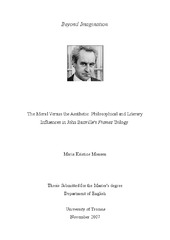Beyond imagination : the moral versus the aesthetic : philosophical and literary influences in John Banville's Frames trilogy
Permanent link
https://hdl.handle.net/10037/1343Date
2007-11-26Type
Master thesisMastergradsoppgave
Author
Monsen, Maria KristineAbstract
The main focus for my thesis will be on John Banville’s Frames trilogy (2001) and the author's rendering of the limitations and possibilities of the aesthetic individual. In order to show how the tension between the aesthetic and the moral existence is illustrated by Banville’s protagonists, I have also included in my analysis certain literary and philosophical influences that I have found relevant.
In chapter one I am going through central points in Søren Kierkegaard's and Friedrich Nietzsche's philosophies. I have put the emphasis on Kierkegaard's Either/Or (1843) in order to apply his discussion of his three stages of existence, the aesthetic, ethical and religious, to my analysis of Banville's trilogy. In this section I am attempting to illustrate the traits belonging to the aesthetic individual, as depicted in the character Johannes, and try to show that Kierkegaard's term of the aesthetic individual is transferable to Banville's protagonists in the trilogy.
In order to show the Nietzschean element so prominent in Banville's protagonists, especially in Freddie Montgomery, I am referring to Nietzsche's early book, The Birth of Tragedy through the Spirit of Music (1872). It is my aim to show how Nietzsche's essential world-view of the lack of purpose of existence, lies at the bottom of the postmodern consciousness of Banville's characters. I am also looking at Nietzsche's Genealogy of Morals (1887) in showing how Nietzsche's view on guilt and conscience as invalid concepts converge with the protagonists' in Frames. The last part of the chapter consists of a comparison between the converging concepts of the two philosophies, my point of departure being Tom P. S. Angier's recent book Either Kierkegaard /Or Nietzsche (2006), and an initial analysis of Frames based in these ideas.
In chapter two, in order to illustrate my points further, I am analysing parts of Vladimir Nabokov's Lolita (1957) and Fjodor Dostojevskij's Crime and Punishment (1866) to show how different aspects by these two classic novels can be compared to plot and characters in Frames. The emphasis here will be on the complexity of the protagonist in each of the novels, that resembles the mentality and character traits of the protagonist in Frames.
Chapter three contains the sustained analysis of the trilogy. The first part explores how Banville's protagonists' relate differently to their female other, while the second part of the analysis is concerned with the protagonist's quest for essence in a world where he finds no purpose.
Publisher
Universitetet i TromsøUniversity of Tromsø
Metadata
Show full item recordCollections
Copyright 2007 The Author(s)
The following license file are associated with this item:


 English
English norsk
norsk